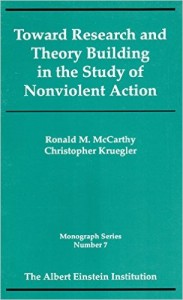Extrait de l’ouvrage: Ronald M. MCCARTHY et Christopher KRUEGLER, Toward Research and Theory Building in the Study of Nonviolent Action, Monograph Series Number 7, The Albert Einstein Institution, Cambridge, MA; 35 p.
Pour consultez l’ouvrage complet, veuillez cliquer sur Toward Research and Theory Building in the Study of Nonviolent Action
 Nonviolent action is arguably a universal phenomenon, in the sense that it occurs throughout history and across social and political systems. Today’s news often carries stories about nonviolent struggle. Events such as labor strikes, protest marches, and the defiance of governmental authority by groups of people occur in all parts of the world. No form of government appears to be immune from nonviolent challenges, neither the most repressive nor the most democratic. Nor are examples of nonviolent action limited to the current period historical research frequently discloses similar actions by people as varied as members of the medieval guilds, African-American slaves, and upper-class English women. Nevertheless, nonviolent action remains poorly understood as a distinctive phenomenon. Because it overlaps with other areas of human behavior that receive much more study on their own-such as social conflicts, state violence and repression, war, and collective action and protest-nonviolent action has been subsumed into these fields, to the extent that it is studied at all. As a result, behavior that clearly qualifies as nonviolent action has not been studied as such; rather, it has been treated as a marginal part of other areas of interest. Further, the field of research on nonviolent action itself generally lacks clear definition as the study of a genuinely empirical category of human actions in conflicts. Without a firm identity, the research enterprise has had great difficulty constructing a progressive research program A major challenge for theorists and researchers is to address such deficits and move toward the creation of a more productive field of study. This essay argues that a framework for such inquiry already exists, which we will call the « technique approach » to nonviolent action. We propose that a coherent research program can be sketched out in a way that incorporates existing research and knowledge into this framework and generates productive new research questions. We do not intend to offer a theory of nonviolent action here, in the sense that theory is used in positive social science. Our more modest ambition is to identify how the technique approach provides ways to examine current ideas about nonviolent action critically, exposing a number of « red herrings and contributing to other research in the domain of human conflict. The claim made in this essay is that nonviolent action, properly understood, constitutes a readily identifiable, recurring, and significant human activity in the prosecution of conflicts. It is one that can be defined, recognized, and understood. The technique approach to the study of nonviolent action contains the outlines of a researchable field of empirical knowledge. Briefly stated, the technique approach maintains that research will be most fruitful when focused on nonviolent action as purposive behavior in conflicts and on the problems and possibilities that nonviolent action raises for actors in conflicts.
Nonviolent action is arguably a universal phenomenon, in the sense that it occurs throughout history and across social and political systems. Today’s news often carries stories about nonviolent struggle. Events such as labor strikes, protest marches, and the defiance of governmental authority by groups of people occur in all parts of the world. No form of government appears to be immune from nonviolent challenges, neither the most repressive nor the most democratic. Nor are examples of nonviolent action limited to the current period historical research frequently discloses similar actions by people as varied as members of the medieval guilds, African-American slaves, and upper-class English women. Nevertheless, nonviolent action remains poorly understood as a distinctive phenomenon. Because it overlaps with other areas of human behavior that receive much more study on their own-such as social conflicts, state violence and repression, war, and collective action and protest-nonviolent action has been subsumed into these fields, to the extent that it is studied at all. As a result, behavior that clearly qualifies as nonviolent action has not been studied as such; rather, it has been treated as a marginal part of other areas of interest. Further, the field of research on nonviolent action itself generally lacks clear definition as the study of a genuinely empirical category of human actions in conflicts. Without a firm identity, the research enterprise has had great difficulty constructing a progressive research program A major challenge for theorists and researchers is to address such deficits and move toward the creation of a more productive field of study. This essay argues that a framework for such inquiry already exists, which we will call the « technique approach » to nonviolent action. We propose that a coherent research program can be sketched out in a way that incorporates existing research and knowledge into this framework and generates productive new research questions. We do not intend to offer a theory of nonviolent action here, in the sense that theory is used in positive social science. Our more modest ambition is to identify how the technique approach provides ways to examine current ideas about nonviolent action critically, exposing a number of « red herrings and contributing to other research in the domain of human conflict. The claim made in this essay is that nonviolent action, properly understood, constitutes a readily identifiable, recurring, and significant human activity in the prosecution of conflicts. It is one that can be defined, recognized, and understood. The technique approach to the study of nonviolent action contains the outlines of a researchable field of empirical knowledge. Briefly stated, the technique approach maintains that research will be most fruitful when focused on nonviolent action as purposive behavior in conflicts and on the problems and possibilities that nonviolent action raises for actors in conflicts.
